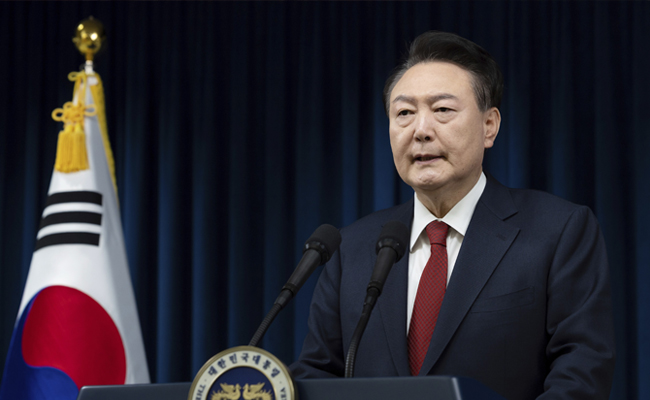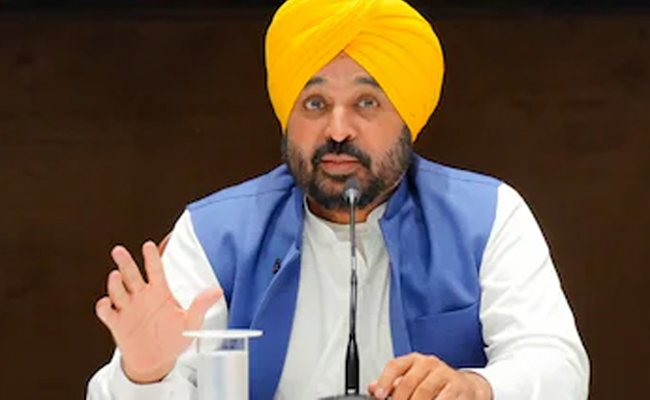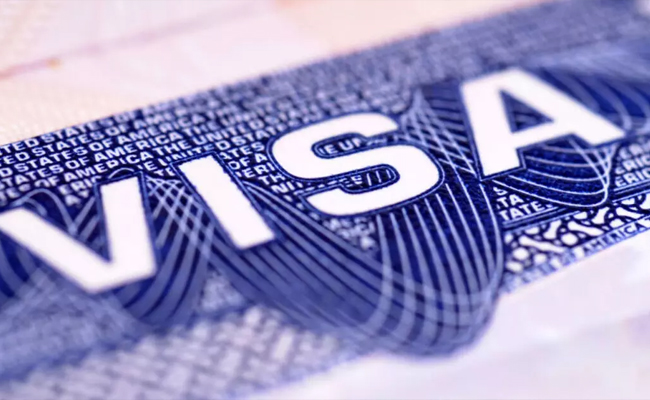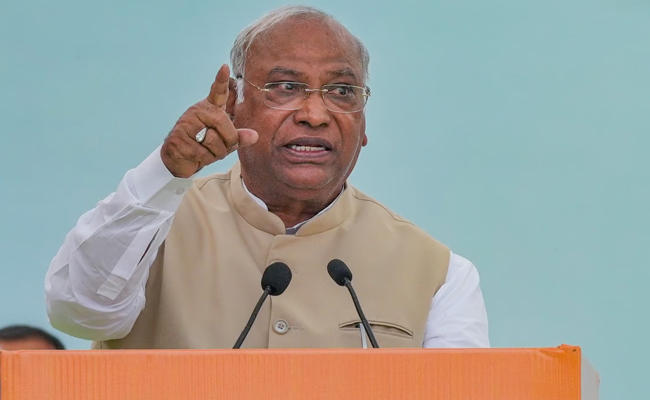Seoul (AP): South Korea's anti-corruption agency and police debated on Monday more forceful measures to detain impeached President Yoon Suk Yeol after their previous attempt was blocked by the presidential security service last week.
The discussions highlighted the obstacles facing the criminal investigation into Yoon's Dec. 3 martial law decree, which led to his impeachment on Dec. 14. The one-week detention warrant was set to expire at midnight, but the agency requested a new court warrant to extend the timeframe for taking Yoon into custody.
The Seoul Western District Court last week issued a warrant to detain Yoon and a separate warrant to search his residence after he defied authorities by refusing to appear for questioning over his brief power grab. Executing those warrants is complicated as long as Yoon remains in his official residence.
Yoon has described his power grab as a necessary act of governance against a liberal opposition bogging down his agenda with its legislative majority and has vowed to “fight to the end” against efforts to oust him. While martial law lasted only several hours, it set off turmoil that has shaken the country's politics, diplomacy and financial markets for weeks and exposed the fragility of South Korea's democracy while society is deeply polarized.
The Corruption Investigation Office for High-Ranking Officials, which leads a joint investigation with police and military investigators, revealed Monday it had asked police to take over efforts to detain Yoon, following its prominent role in Friday's failure.
However, the anti-corruption agency backtracked hours later after the police stated it could be legally problematic for them to be entirely responsible for Yoon's detention, given that the warrants had been obtained by the agency.
The agency, which has faced questions about its competence after failing to detain Yoon, said the efforts to execute the warrants would be carried out under the authority of the joint investigation team but did not clarify whether its approach would change.
Police vow more forceful efforts to detain Yoon
Police say they plan to make a more aggressive effort to detain Yoon at the official residence, where members of the presidential security staff were seen installing barbed wire near the gate and along the hills leading up to the building.
A police official, who spoke on condition of anonymity per department rules, told reporters there were discussions with the anti-corruption agency on whether to arrest members of the presidential security staff if they forcefully obstruct efforts to detain Yoon.
When asked about the possibility of deploying police special task forces, the official said “all available options” were being reviewed.
If investigators manage to detain Yoon, they will likely ask a court for permission to make a formal arrest. Otherwise, he will be released after 48 hours.
Meanwhile, the agency has urged the country's acting leader, Deputy Prime Minister Choi Sang-mok, to instruct the presidential security service to comply with the execution of the detainment warrant. Choi has yet to publicly comment on the issue.
Yoon's lawyers argued the detention and search warrants against the president cannot be enforced at his residence due to a law that protects locations potentially linked to military secrets from search without the consent of the person in charge — which would be Yoon. They also argue the anti-corruption office lacks the legal authority to investigate rebellion charges and delegate police to detain Yoon.
Yoon's lawyers file complaints
Yoon's lawyers on Monday filed complaints with public prosecutors against the anti-corruption agency's chief prosecutor, Oh Dong-woon, and six other anti-corruption and police officers for orchestrating Friday's detainment attempt, which they claim was illegal.
The lawyers also filed complaints against the country's acting national police chief, the acting defense minister and two Seoul police officials for ignoring the presidential security service's request to provide additional forces to block the detention attempt. The lawyers said they also plan to file complaints against some 150 anti-corruption and police investigators who were involved in Friday's detention attempt.
The anti-corruption agency has been weighing charges of rebellion after Yoon declared martial law and dispatched troops to surround the National Assembly. Lawmakers who managed to get past the blockade voted to lift martial law hours later.
His fate now lies with the Constitutional Court, which has begun deliberations on whether to formally remove Yoon from office or reinstate him.
Let the Truth be known. If you read VB and like VB, please be a VB Supporter and Help us deliver the Truth to one and all.
Baghpat (PTI): An interstate cyber-fraud racket involved in duping people on the pretext of providing bank jobs was busted by police in this Uttar Pradesh district on Sunday with the arrest of seven people, including two women, officials said.
Police said the accused were running a fake call centre and luring job seekers from several states by issuing forged appointment letters and fabricated agreements in the name of bank recruitment, collecting large sums of money in return.
READ READ: Meat, alcohol ban at three 'holy cities' now in effect: Punjab CM Mann
Twelve mobile phones, two laptops, two SIM cards on fake names, several forged appointment letters and agreements, 15 bank passbooks, two chequebooks, UPI QR codes, ATM cards and 11 other cards were seized from the possession of the accused, police said, adding that the data of around 6,450 people from different states was found stored in the laptops.
According to the officials, the gang misused information obtained from online platforms, such as OLX and job-related websites, to target unsuspecting victims.
The racket was uncovered following complaints received on the Union home ministry's "Pratibimb" portal and subsequent technical surveillance.
Investigations revealed at least 20 complaints from various states, including Madhya Pradesh, West Bengal, Maharashtra, Chhattisgarh, Assam and Meghalaya.
The arrested accused were identified as Mohit Kumar, Puneet Kumar, Vardaan, Anuj Kumar and Akshay, besides the two women.
They were arrested at around 11:30 am from under the Eastern Peripheral Expressway in the Kotwali Baghpat area.
A case has been registered at the cyber crime police station under relevant sections of the Bharatiya Nyaya Sanhita and section 66D of the Information Technology Act, police said.





